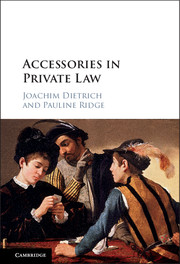1 - Introduction
from PART I - General principles
Published online by Cambridge University Press: 05 February 2016
Summary
An organising principle of accessory liability
When a person commits a civil wrong, other persons may in some circumstances also be held legally liable for some or all of the consequences of that wrong despite not having personally satisfied all its elements. Legal concepts that explain such liability include vicarious liability as an employer or a principal; attribution to a principal of the acts of agents or alter egos; breach of non-delegable duties; receipt of benefits or property as a consequence of the wrong; and accessory liability. This book considers the last of these concepts.
Specifically, this book concerns whether there is an organising principle of accessory liability discernible throughout private law. We argue that there is indeed such a principle and seek to explain its elements and operation. Our claim is not novel. Many judges and commentators have suggested that this might be so, although there is no consensus regarding how such a principle might operate or what its contents might be.
At its core, the notion of an accessory is intuitively simple: an accessory is someone who is wrongfully involved in another's wrong. As with many concepts, however, legally defining ‘accessory liability’ and drawing the precise boundaries between it and other, perhaps related, concepts is not easy. We argue that there are three key elements of accessory liability in its various manifestations throughout private law, namely:
(1) a primary wrong committed by another;
(2) involvement, through conduct by the accessory, in that wrong; and
(3) a requisite mental state on the part of the accessory, generally knowledge of the other's wrong.
The contents of each element of the organising principle are fleshed out by specific doctrines within the common law, equity and statute. Ultimately, the question of liability is a normative one of whether a person is sufficiently involved in the primary wrong with sufficient knowledge such that it is appropriate to hold him or her liable for the primary wrong of the primary wrongdoer. The answer depends on the primary wrong that has been committed, particularly in light of the purposes and values promoted by the law proscribing that wrong, and the factual context in which that wrong came about. In simple terms, accessory liability is justified by the accessory's own wrongful conduct that contributes to the commission of the primary wrong. These matters form the subject matter of our book.
- Type
- Chapter
- Information
- Accessories in Private Law , pp. 3 - 9Publisher: Cambridge University PressPrint publication year: 2016



